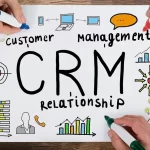Customer-focused marketing has been a trend since the 1960s, with Lester Wunderman introducing the term “customer-centric” in the 1960s.In today’s business landscape, selecting the right CRM software is crucial for enterprises seeking tailored solutions. CRM has transformed businesses like out-of-hours call center companies, introducing changes in marketing channels, customer loyalty methods, and technological advancements.
The future of the CRM market is uncertain, but it is expected to shape businesses in the coming years. Understanding the industry, the latest trends and its future is essential for businesses seeking effective CRM solutions.
Taking from AI-driven innovations to industry-specific solutions, the given blog connects the latest and upcoming trends that will give you actionable strategies to enhance the CRM approach and drive meaningful results for the business.
Understanding CRM’s Role in Retail Evolution
CRM plays a crucial role in the retail industry, providing valuable insights into customer behavior and preferences. By gathering customer data such as purchase history, browsing patterns, preferences, and demographics, retailers can create a centralized customer profile that can be accessed by the team. This data can be used to tailor marketing messages to customers, enabling them to make more informed decisions about inventory management and pricing strategies.
CRM also helps in optimizing sales and revenue by providing data on customer purchasing patterns, sales trends, and inventory levels. This information can help retailers plan their inventory accordingly, minimize stockouts, and increase profitability. Additionally, CRM centralizes customer information, allowing support teams to provide appropriate support.
CRM for retail centralizes customer information, allowing users to access a comprehensive database of customer profiles and their interaction history. This allows for quicker and more informed responses from support representatives. CRM also aids in data-driven marketing campaigns, segmenting customer data based on criteria like purchase history, demographics, and behavior.
In addition to providing insights into customer purchasing patterns and trends, CRM can facilitate inventory and supply chain coordination. By capturing customer data, supply chain managers can plan future demands more accurately, ensuring smoother operations and timely deliveries.
Operational efficiency is further enhanced by CRM software, which can automate routine tasks like follow-up emails, appointment scheduling, and inventory updates. Integration with other retail systems like POS and ERP can further streamline operations and ensure data consistency. Overall, CRM plays a vital role in the retail industry, enhancing customer experience, inventory management, and overall business success.
Top CRM Trends to Look in 2025
With the growing expectations of the retail industry, the need to be intuitive and smart arises on its own. CRM, a crucial component of business operations, is predicted to experience significant growth, with the global market expected to reach $145.79 billion by 2029, driven by a 12.5% CAGR.
With the growth of CRM predicted, here are the top trends that are taken in view of the upcoming year.
The Rise of Conversation-Driven Engagement:
CRM systems are revolutionizing the retail sector by enabling conversation-driven engagement, and transforming how businesses interact with customers. This shift moves beyond traditional transactional relationships to create more meaningful, personalized dialogues with consumers. Modern retail CRM platforms now incorporate advanced conversational capabilities powered by AI and natural language processing, enabling consistent, contextual communication across multiple channels.
Retailers are implementing conversation-driven strategies through AI-powered virtual shopping assistants, interactive product discovery sessions, personalized post-purchase follow-ups, and proactive service notifications. The future of conversation-driven engagement in retail CRM lies in sophisticated applications like predictive conversation modeling, voice commerce integration, emotion-aware responses, and AR/VR-enabled interactive shopping experiences.
Key Integrations for Streamlined Data:
CRM systems are increasingly being used in various tech-related tasks, such as ERP solutions, HR management, accounting tools, and CRM systems, to enhance efficiency and reduce costs. However, using multiple tools can be overwhelming, especially for small businesses with fewer than ten employees. CRM developers have expanded their focus beyond contact management to include sales, marketing, and customer relationship management. The trend is towards software that integrates multiple tools or is compatible with third-party applications, prioritizing usability and streamlined technical setups. It is advisable to choose CRM software that can connect with other tools for easy integration.
BridgeSuite, a leading lead management system, offers robust features for easy data format transformation and adjustment, making it an ideal solution for businesses seeking to integrate multiple systems without hassle.
Advent of the Autonomous Customer Experience:
The retail industry is undergoing a significant transformation with the emergence of autonomous customer experience (ACE), a new era where AI and automation create self-driving customer journeys that adapt and evolve in real-time.
ACE focuses on predictive intelligence, smart automation, and personalized experiences, requiring minimal human intervention while maintaining high levels of personalization. Key components of ACE include predictive intelligence, smart automation, and personalized recommendations. Implementation strategies include AI-powered customer journey orchestration, automated cross-channel engagement, self-learning customer service systems, and predictive analytics for customer behavior.
The business impact of autonomous customer experience includes reduced operational costs, increased customer satisfaction, higher conversion rates, improved customer lifetime value, and enhanced operational efficiency. Future implications include more sophisticated AI decision-making, enhanced predictive capabilities, deeper integration across channels, and greater automation of complex processes. Challenges include data privacy and security, integration with legacy systems, customer acceptance and trust, and balancing automation and human touch.
Inclusion of Chatbots:
Chatbots are advanced tools that offer round-the-clock customer support, allowing human service agents to focus on complex issues. They can personalize responses by accessing customer profiles and previous interactions in the CRM system, greeting customers by name, and referring to past purchases. They can instantly handle common questions and basic issues, reducing waiting times and speeding up the resolution process. The regular updates and support help businesses stay competitive and maximize returns on CRM investments, especially for smaller companies seeking cost-effective implementation of CRM.
Leveraging IOT:
The Internet of Things (IoT) is a CRM trend for 2025, enabling businesses to gain real-time insights into customer behavior. IoT-enabled devices transmit data about usage patterns and potential issues to CRM systems, enabling proactive and preventative customer service.
For example, a fitness tracker that syncs with CRM can suggest workout programs and dietary advice based on activity data, boosting customer satisfaction and loyalty.
IoT data also provides a deeper understanding of customer usage, enabling optimization of product design, user experience enhancement, and improvement areas.
Conclusion:
In the upcoming year 2025, retail businesses are set to adopt advanced BridgeSuite CRM software to stay competitive in this technologically advanced world. The solutions offer AI-driven insights, personalized marketing, and seamless customer interaction, optimizing operations and increasing sales. The data & customer insights predict that in 2025, advanced CRMs like BridgeSuite will focus on simplicity and authenticity, as customers will prioritize human interactions over robotic experiences for genuine connections.
Embracing the latest CRM trends is crucial for success in the competitive business world. CRM developers design industry-specific solutions targeting healthcare, real estate, and other industries. Choosing a relevant CRM solution and a mobile-compatible system, preferably one your team is comfortable working with is essential.







0 Comments